
The Peter J. Tobin College of Business has been one of only 38 institutions from 20 countries to become a PRME institution, meaning that it committed to integrating the UN Sustainability Development Goals (SDGs) into curriculum, research and partnership activities. Taking that distinction seriously, the Tobin Department of Accountancy has instituted three accounting courses that address issues of sustainability.
The three courses in the Department -- Sustainability Reporting, Sustainability Assurance and Sustainability Implementation – distinguish Tobin as being the only accredited accounting program to offer so many courses in this area. By contrast, only eight of the 179 accounting departments accredited by the Association to Advance Collegiate Schools of Business (AACSB) offer a single course that uses either “Sustainability” or “Social Responsibility” in the course title.
“This is an emerging trend and one that is still, arguably, underserved by today’s business colleges,” said Associate Professor of Accountancy Timothy G. Coville, Ph.D, who spearheaded this effort. As evidence, he points to interest from two prominent professional organizations -- the American Institute of Certified Public Accountants (AICPA), the national membership organization of the profession, as well as the AACSB – as providing the impetus for these curriculum additions.
As early as 2013, the AICPA issued a paper that encouraged accountants to use their expertise and skills to “help an organization link sustainability activities to strategies using accounting measures, tools, theories, and techniques.” Later that year, the AACSB added “diversity, sustainable development, environmental sustainability, and other emerging corporate and social responsibility issues” to its accreditation standards for accounting programs.
“We embraced the suggestions made by the AACSB, as we are in the habit of doing, given our pride in maintaining our status as one of the fewer than 200 accounting programs globally to have a dual accreditation with our College’s AACSB accreditation,” said Coville. “It also helped that the Sustainability Accounting Standards Board (SASB), which was founded in 2011 to develop these standards, instituted the Fundamentals of Sustainability Accounting (FSA) Credential.”
As a member of the first cohort of fewer than 100 individuals to earn this credential, Coville uses his acquired knowledge to impart the importance of this topic to his students at both the undergraduate and graduate levels.
“I was compelled to study not only the history and evolution of how we have arrived at the current state of sustainability reporting and also the methods to identify, manage and analyze material sustainability information,” he said. “Combining this knowledge with my experience as a certified public accountant and an accounting professor, it became apparent that three of a normal accounting programs’ disciplines -- financial reporting, auditing, and managerial reporting, otherwise known as cost accounting -- also made sense for training future professionals dealing with sustainability-related information.”
As Tobin enters its fourth year of offering these courses in the accountancy curriculum, Coville sees a bright future for the students who choose to avail themselves of these options. He noted that, even in the pandemic suppressed hiring environment of this past summer, companies in the S&P 500 had an average of three openings listed with the terms Environmental, Social & Governance (ESG) or Sustainability in the job title.
“This education helps our students to understand the various dimensions of sustainability and allows them to consider the related risks and opportunities for any organization they join,” he said. “Too many people think of sustainability as some sort of anti-capitalist tree-hugger movement, when it is in fact a risk management movement that considers the various directions in which things can go wrong.”
